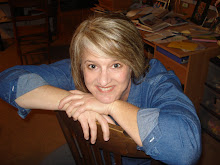Is Oswald saying that if you have to work at love it isn't love? "The evidence of our love for Him is the absolute spontaneity of our love, it comes naturally" -- Oswald. But what if it doesn't? Are we supposed to wait for it to "burst up in extraordinary ways"? What if human beings applied the same principle to their relationships with each other? Unquestionably, my love for my husband and my children does explode in exciting ways on occasion, but much more often, it takes the form of making sandwiches at 7:15 in the morning or trying to wrap my brain around homework on the mode, the mean, and the median at 9:55 at night.
I agree with Oswald that attempting to prove our love seems backwards and probably futile, but what about practicing love? Can't we practice being patient and kind, slow to anger, quick to forgive? and work at not being jealous or boastful or delighting when bad things happen to the people we don't really like? Why would it be wrong to hold the statements of Jesus or of Paul in front of us like a standard?
"The springs of love are in God, not in us" -- Oswald. Amen and amen to that. And I'm delighted that the Holy Spirit is responsible for manifesting that love in us. I'm just not sure that means we don't have to work at it.


